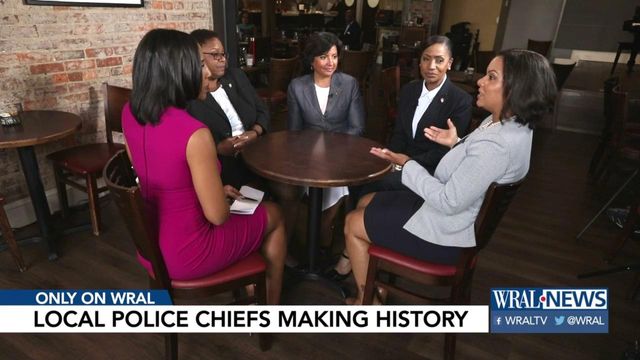Life experiences, strong leadership give black, female NC police chiefs unique qualifications
With 100 years of combined experience, four of North Carolina's female African-American police chiefs are using their unique perspectives to change how their departments work with communities.
Posted — UpdatedRaleigh's Cassandra Deck-Brown, Durham's CJ Davis, Morrisville's Patrice Andrews and Fayetteville's Gina Hawkins have risen through the ranks, in some of the most dangerous units on the force, such as gangs and narcotics. While none would call hers a meteoric rise, all agreed they spent years constantly proving themselves ready for the position of top cop.
Videos of violent encounters with police—largely between officers and African-American men—play out as the public scrutinizes the officers' every decision. Despite the challenges, though, the four black, female chiefs said they are uniquely suited to lead departments through this time.
"It affects you, first of all, because we are wearing the uniform, and because we are caught in the middle," said Raleigh's Chief Cassandra Deck-Brown.
As a black woman and career police officer, Chief Patrice Andrews, of Morrisville, said she intimately understands the complex relationship between communities of color and the police departments that serve them.
"They may look at me as a traitor, or, you know, (like) I should be able to either give them a break," Andrews said. "(They look at me like) 'You can give me a break because we're in this together.' Well, I'm a police officer and you broke the law."
But that relationship doesn't come easy.
"What I find difficult is when I hear the conversation—the 'us against them' conversation—and I'm thinking to myself, 'Well, I'm part of them, too. I'm part of that community," Durham Police Chief Cerelyn C.J. Davis said.
The women said their perspective is increasingly valued at departments around the nation that are looking for new direction, and they use their personal experiences to help train their respective departments.
Deck-Brown said a public voice rose out of the shooting of 18-year-old Michael Brown in Ferguson, Missouri. The Raleigh chief said the 2014 events in Ferguson reminded her of scenes from the Civil Rights movement in the 1960s.
But that perspective goes back even further, and Deck-Brown said it helps explain how the distrust between minorities and police began.
"If you go back to the 1830s, we're talking about slave patrol," Deck-Brown said. "That historical perspective of law enforcement and recognizing that we have not always done, collectively, the right thing."
Even though they have dedicated their careers to law enforcement, all four are mothers at home—and each mother has had a conversation with their children about how to deal with the possibility of racial profiling by police.
"We sit down, and we talk about it and say, 'Hey, if you are with your friends in a neighborhood and a police officer stops you and wants to talk to you, that's fine. Talk to the officer,'" Andrews said, adding that any citizen should file a complaint immediately if they feel they were wronged.
Fayetteville Police Chief Gina Hawkins said the conversations about race and policing always happened in her family, and that didn't change when she became an officer.
"We've always been of color," Hawkins said. "We've always had those family members, and that conversation that we have with our family members and our friends doesn't change because we happen to have our uniform on."
Now, the women are working to be part of a shift in how police officers work with their communities. Davis said she held focus groups after starting as chief because the department was being criticized by some minorities for unfair targeting before she got there.
Hawkins' predecessor, Harold Medlock, was recognized for community policing policies, like limiting traffic stops for minor offenses. Hawkins said she wants to continue that trend and up the ante.
"Now is that time where we have the opportunity to look at where we are, look at where we've been and how we can effect change in the future, thus, leaving a legacy," Hawkins said.
Ultimately, the chiefs said, it's not about color or gender—it's about leadership and keeping communities and officers safe.
"If you look at why we are in this profession in the first place, the calling and the compassion, humanity has no color," Deck-Brown said.
• Credits
Copyright 2024 by Capitol Broadcasting Company. All rights reserved. This material may not be published, broadcast, rewritten or redistributed.






